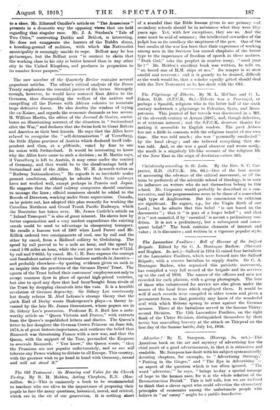The new number of the Quarterly Review contains several important
articles. The editor's critical analysis of the Peace Treaty emphasizes the essential justice of the terms. Strangely enough, however, he would have restored East Africa to the Germans, thus disregarding the welfare of the natives and compelling all the Powers with African colonies to maintain large defensive forces. Ho also doubts the wisdom of trying the ex-Kaiser, and regards the economic demands as too severe. M. William Martin, the editor of the Journal de Geneve, contributes an illuminating account, of the situation in "Switzerland after the War," and declares that the Swiss look to Great Britain and America as their best friends. He says that the Allies have refused to recognize the " self-determination " of Vorarlberg, the little Alpine province of Austria which declared itself independent and then, at a plebiscite, voted by four to one for union with Switzerland. It would be interesting to know why the Allies have come to such a decision ; as M. Martin says, if Vorarlberg is left to Austria, it may come under the control of Germany, and that would be to the disadvantage both of Switzerland and of the Allies. Mr. W. H. Acworth writes on "Railway Nationalization." He regards it as inevitable under present conditions, although he admits that State railways have not worked well, except perhaps in Prussia and Japan. He suggests that the chief railway companies should continue to manage the lines ; official nominees should be added to the Boards of Directors, working under State supervision. Canada, as he points out, has adopted this plan recently for working the Canadian Northern and Grand Trunk Pacific Railways, which the Dominion has taken over. Mr. James Carlisle's article on " Tribawl Transport " is also of great interest. He shows how by better organization and a very modest expenditure the existing canals could be used to advantage in cheapening transport. He recalls a famous test of 1907 when Lord Fairer and Mr. Killiok ordered two consignments of coal, one by rail and the other by canal, from a Midland colliery to, Godalming. The speed by rail proved to be a mile an hour, and the speed by canal 1.08 miles an hour, while the cost per ton-mile was 0.711d. by rail and 0.663d. by -canal. Mr. C. H. Burr exposes the corrupt and fraudulent nature of German business methods in America— and probably elsewhere—by quoting evidence given on oath in an inquiry into the practices of the German Dyers' Trust. The agents of the Trust bribed their customers' employees not only to accept common dyes in place of special high-priced varieties, but also to spoil any dyes that had beenl'hought from rivals of the Trust by dropping chemicals into the vats. It is a horrible revelation of German depravity. Sir Sidney Lee courteously but firmly refutes AL Abel Lefranc's strange theory that the sixth Earl of Derby wrote Shakespeare's plays—a theory invented by the late Mr. James Greenstreet, whose papers are in Sir Sidney Lee's possession. Professor R. S. .Rait has a noteworthy article on "Queen Victoria and France," with extracts from the Queen's unpublished letters and diaries. The Queen's letter to her daughter the German Crown Princess on June 8th, 1874, is of great historic importance, as it confirms the belief that Bismarck was threatening France with a new war, and that the Queen, with the support of the Tsar, persuaded the Emperor to overrule Bismarck. "You know," the Queen wrote, "that the Prussians are not popular unfortunately, and no one will tolerate any Power wishing to dictate to all Europe. This country, with the greatest wish to go hand in hand with Germany, tannot and will not stand it."


































 Previous page
Previous page